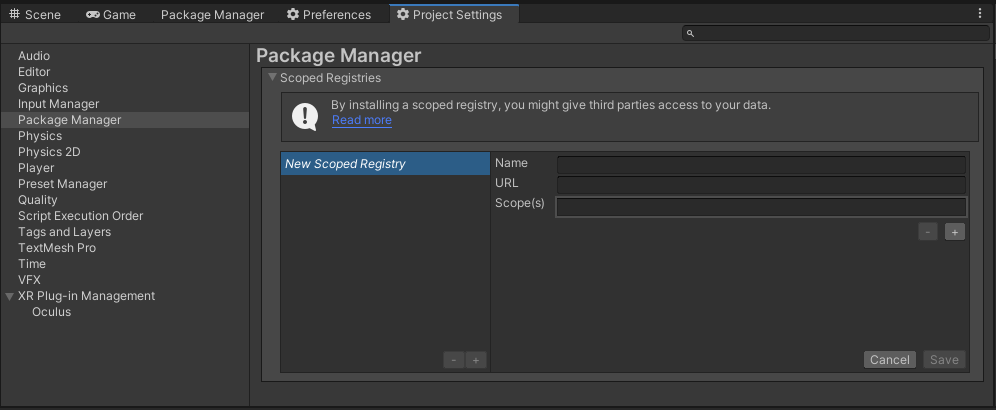A Build Pipeline utility package for the Unity Game Engine.
- Open your Unity project settings
- Select the
Package Manager
- Add the OpenUPM package registry:
- Name:
OpenUPM - URL:
https://package.openupm.com - Scope(s):
com.utilities
- Name:
- Open the Unity Package Manager window
- Change the Registry from Unity to
My Registries - Add the
Utilities.BuildPipelinepackage
- Open your Unity Package Manager
- Add package from git url:
https://github.com/RageAgainstThePixel/com.utilities.buildpipeine.git#upm
This package is designed to be use in conjunction with a CI/CD pipeline, such as 
-
Create a new action workflow file using
.github/workflows/unity-build.yml -
Add the following content to the file:
name: unity-build
on:
push:
branches:
- 'main'
pull_request:
branches:
- '*'
# Allows you to run this workflow manually from the Actions tab
workflow_dispatch:
concurrency:
group: ${{ github.ref }}
cancel-in-progress: true
jobs:
build:
runs-on: ${{ matrix.os }}
strategy:
# max-parallel: 2 # Use this if you're activating pro license with matrix
matrix:
include:
- os: windows-latest
build-target: StandaloneWindows64
- os: macos-latest
build-target: StandaloneOSX
- os: ubuntu-latest
build-target: StandaloneLinux64
steps:
- uses: actions/checkout@v4
# Installs the Unity Editor based on your project version text file
# sets -> env.UNITY_EDITOR_PATH
# sets -> env.UNITY_PROJECT_PATH
# https://github.com/XRTK/unity-setup
- uses: xrtk/unity-setup@v7
with:
modules: ${{ matrix.build-target }}
# Activates the installation with the provided credentials
# https://github.com/XRTK/activate-unity-license
- uses: xrtk/activate-unity-license@v5
with:
# Required
username: ${{ secrets.UNITY_USERNAME }}
password: ${{ secrets.UNITY_PASSWORD }}
# Optional
license-type: 'Personal' # Chooses license type to use [ Personal, Professional ]
auth-key: ${{ secrets.UNITY_2FA_KEY }} # Required for personal activations
# serial: ${{ secrets.UNITY_SERIAL }} # Required for pro/plus activations
- name: Unity Build (${{ matrix.build-target }})
uses: RageAgainstThePixel/unity-build@v7
with:
build-target: ${{ matrix.build-target }}In addition to any already defined Unity Editor command line arguments, this plugin offers some additional options:
| Argument | Description |
|---|---|
-ignoreCompilerErrors |
Disables logging. |
-autoIncrement |
Enables auto incrementing. |
-versionName |
Sets the version of the application. Value must be string. |
-versionCode |
Sets the version code of the application. Value must be an integer. |
-bundleIdentifier |
Sets the bundle identifier of the application. |
-sceneList |
Sets the scenes of the application, list as CSV. |
-sceneListFile |
Sets the scenes of the application, list as JSON. |
-buildOutputDirectory |
Sets the output directory for the build. |
-acceptExternalModificationsToPlayer |
Sets the build options to accept external modifications to the player. |
-development |
Sets the build options to build a development build of the player. |
-colorSpace |
Sets the color space of the application, if the provided color space string is a valid ColorSpace enum value. |
-buildConfiguration |
Sets the build configuration of the application. Can be: debug, master, or release. |
-export |
Creates a native code project for the target platform. |
-symlinkSources |
Enables the use of symbolic links for the sources. |
-disableDebugging |
allowDebugging. Disables the ability to attach remote debuggers to the player. |
-allowDebugging |
Enables or disables the ability to attache a remote debugger to the player. Can be: true or false. |
-dotnetApiCompatibilityLevel |
Sets the dotnet api compatibility level of the player. Can be: NET_2_0, NET_2_0_Subset, NET_4_6, NET_Unity_4_8, NET_Web, NET_Micro, NET_Standard, or NET_Standard_2_0. |
-scriptingBackend |
Sets the scripting framework of the player. Can be: Mono2x, IL2CPP, or WinRTDotNET. |
-autoConnectProfiler |
Start the player with a connection to the profiler. |
-buildWithDeepProfilingSupport |
Enables deep profiling support in the player. |
| Argument | Description |
|---|---|
-splitBinary |
Builds an APK per CPU architecture. |
-splitApk |
Uses APK expansion files. |
-keyaliasPass |
Sets the key alias password. |
-keystorePass |
Sets the keystore password. |
-symbols |
Sets the symbol creation mode. Can be: public, debugging, or disabled. |
| Argument | Description |
|---|---|
-arch |
Sets the build architecture. Can be: x64, arm64, or x64arm64. |


